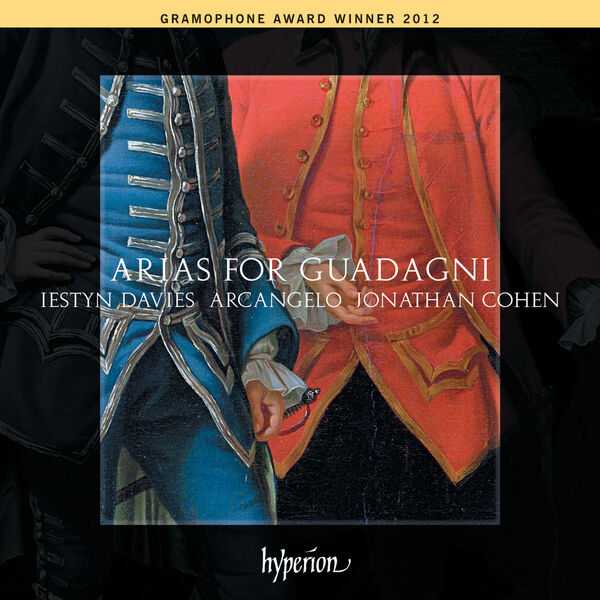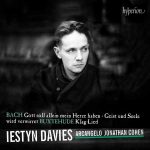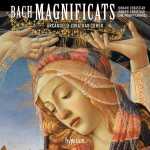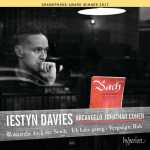

Composer: Thomas Arne, Carl Philipp Emanuel Bach, Christoph Willibald Gluck, Gaetano Guadagni, George Frideric Handel, Johann Adolph Hasse, John Christopher Smith
Performer: Iestyn Davies, Arcangelo
Conductor: Jonathan Cohen
Format: FLAC (tracks)
Label: Hyperion
Catalogue: CDA67924
Release: 2012
Size: 1.32 GB
Recovery: +3%
Scan: yes
01. Handel: O Lord, whose mercies numberless (from Saul, HWV53)
02. Handel: The raptur’d soul (from Theodora, HWV68)
03. Handel: Yet, can I hear that dulcet lay (from The Choice of Hercules, HWV69)
04. Handel: Destructive war (from Belshazzar, HWV61)
05. Handel: Ah che dissi! (from Didone abbandonata)
06. Handel: Se resto sul lido (from Didone abbandonata)
07. Handel: Odi colà la frigia tromba? (from Didone abbandonata)
08. Bach CPE: A trionfar mi chiama (from Didone abbandonata)
09. Smith: Say, lovely Dream! (The Fairies)
10. Arne: Vengeance, O come inspire me! (from Alfred)
Bach CPE: Orchester-Sinfonie in D major, H663 Wq183 / 1
11. I. Allegro di molto
12. II. Largo
13. III. Presto
14. Gluck: Aria. Ah! non turbi il mio riposo (from Telemaco, ossia L’isola di Circè)
15. Gluck: Orphée et Euridice: Dance of the Blessed Spirits
16. Gluck: Che puro ciel! (from Orfeo ed Euridice)
17. Gluck: Ahimè! Dove trascorsi? (from Orfeo ed Euridice)
18. Gluck: Che faro’ senza Euridice? (from Orfeo ed Euridice)
19. Guadagni: Pensa a serbarmi, o cara
British countertenor Iestyn Davies is one of the fastest rising stars on the concert and opera circuit. Following his highly acclaimed recording of Porpora cantatas, he returns for a second solo album with Hyperion, a selection of arias written for Gaetano Guadagni. Italian-born Guadagni was the first ‘modern’ castrato, famed all over Europe for the lyric purity of his voice and his powerful, naturalistic acting style. Not only did he enjoy a close artistic relationship with Handel, who nurtured Guadagni’s voice to fit the alto roles in his English oratorios, but he effectively created the role of Orpheus in Gluck’s Orfeo ed Euridice, an opera he thoroughly made his own. Here, Iestyn Davies is joined again by the renowned period-instrument band Arcangelo, directed by Jonathan Cohen.
Gaetano Guadagni (1728-1792) was one of the leading castrati of his time and composers such as Handel and Gluck wrote important roles for him. He was known not for having a particularly large voice but for his dazzling technique and dramatic sensitivity. Iestyn Davies does not, on first impression, stand out as among the most spectacular of the extraordinary crop of counter tenors to emerge in the first decade of the 21th century. His singing, though, is notable for the openness and freedom of his vocal production, which gives him an appealing, natural, and unmannered sound. He sings with absolute security, precise intonation, timbral clarity, and his vowels are impeccably pure. He excels in long-breathed lyrical lines and seamless legato phrasing, and most of these selections highlight those strengths rather than providing the kind of high-octane pyrotechnics that singers like Philippe Jaroussky and Max Emanuel Cencic thrive on. Davies is fully capable of the most agile coloratura, though, as he demonstrates in “Destructive war,” from Belshazzar. The naturalness of his delivery and his pure tone make him a counter tenor that even people who don’t generally like counter tenors could warm to.
A caveat that can apply to Davies’ performances is the fact that he does not always draw out the theatricality in these arias, which are taken mostly from dramatic works, either operas or dramatic oratorios. Its context and premise in the oratorio Theodora make “The raptur’d soul,” which extols the joys of martyrdom, one of the nuttiest texts Handel set; Davies delivers it with gorgeous musicality but without a hint of its dramatic import. It’s a reasonable interpretive decision in the context of a recital, and Davies’ performance is musically meaningful and immaculate, but it may not satisfy listeners looking for the visceral charge that the music has the potential to ignite. In any case, it is inarguably musically thrilling, polished singing. Jonathan Cohen draws gorgeous, exceptionally colorful, flexible playing from the British ensemble Arcangelo, a group he founded, and the deployment of the continuo parts is especially inventive, lively, and emotionally apt. The group is given a chance to shine on its own in a highly charged, utterly engaging performance of C.P.E. Bach’s Orchester-Sinfonie in D major. Naxos’ excellent sound is clear, clean, immediate, and warmly ambient, with terrific balance.



